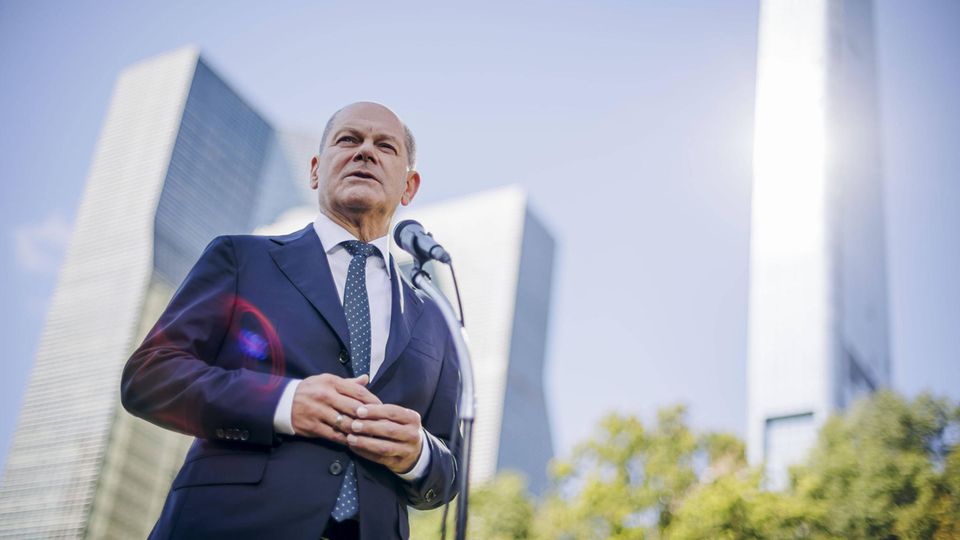analysis
Asylum policy
Scholz and Baerbock – a broken relationship
The Chancellor grins, the Minister sulks – the relationship between Foreign Minister Annalena Baerbock and Chancellor Olaf Scholz seems to have cooled down significantly after his word of power on the issue of asylum
© John McDougal / AFP
After the Chancellor’s word of power: Five findings that do not bode well for the coalition.
Olaf Scholz has decided: Germany will not stop the reform of asylum policy in Europe. From the outset, Baerbock’s offended face refuted all the Greens’ subsequent reassurances that it was not a word of power from the Chancellor.
Germany agrees to the EU compromise – one way or another.
The Foreign Minister can still try to negotiate a few points that are important to the Greens into the common position of the EU states. But Baerbock is dependent on the cooperation of other governments, the Spanish EU Council Presidency and, last but not least, his own colleague Nancy Faeser. And in the end Germany agrees, one way or another. Without regard for Baerbock.
It is not entirely clear how many words of power Scholz has already spoken. Considering that he actually wanted to avoid this instrument, there are quite a few of them. Scholz knows that a power word is more of an expression of leadership weakness than of leadership strength, because its necessity really documents previous failure.
This time it will become particularly clear why the Chancellor would rightly prefer to avoid hitting the table. Because every argument he ends with this soon comes back with new force. Over and over again. And this time the consequences will not only fall on Baerbock, but on Scholz’s entire government.
There was never really anything in common between Baerbock and Scholz
After the asylum dispute, there are several findings that are important for the future of the coalition: Firstly, the relationship between the Chancellor and the Foreign Minister is irreparably broken. There has never been a common line between Scholz and Baerbock in the most important areas of foreign policy. Worse still: the Chancellor and even more so the Minister never really made an effort to do so. This started with arms deliveries to Ukraine, continued in dealings with China and now culminates in asylum policy. This is a problem for Germany’s reputation.
Secondly: In asylum policy, for the first time Olaf Scholz did not assert his power as an intermediary between the coalition partners, but ultimately on his own behalf. The FDP and the Greens may have argued particularly loudly in the last few days (FDP: “Greens are a security risk”; Greens: “lower limit of political decency violated”). But unlike in 2022 in the dispute over the extension of the operating times for nuclear power plants, this time the Chancellor did not mediate the dispute, ordering a compromise between Robert Habeck and Christian Lindner. This time he clearly decided against a coalition partner, namely the Greens. And he decided for another party in the government: no, not the FDP, but his own party, the SPD.
If the compromise fails for Germany, the traffic light will be over
Thirdly: As Chancellor, Scholz had expected, even obvious reasons for deciding the way he did (and it is astonishing that the Greens did not want or could not see these constraints coming): If the asylum compromise were to fail in Germany, that would be the case Federal government in view of the objective pressure from the increasing number of migrants as well as the political pressure from the strengthening of the AfD. The Chancellor had to demonstrate the ability to act, no matter the cost. Scholz is also not a particularly emotionally driven migration politician. He sees the individual right to asylum as sacrosanct for historical reasons – but everything below it is a matter of negotiation. The civic sense of security is more important to him than moral well-being.
Fourth: With the decision against Baerbock, the SPD politician in Scholz is also reporting back. A few days before the state elections in Hesse, he paved the way for his top candidate Nancy Faeser to experience success, probably also in the hope of preventing even worse things for the SPD in Hesse, which is in dire straits. And therefore also for yourself as a sponsor of Faeser and as Chancellor anyway.
The 2025 election campaign has begun – also within the Greens
Fifth: With his decision, Scholz is sending a clear signal. From now on, everyone in the coalition is also their own neighbor. The Chancellor himself demonstrated it. The election campaign for 2025 has begun. Between the parties in the coalition, but also within the Greens. Because the asylum dispute has once again revealed the contrast between Annalena Baerbock and Robert Habeck. While the Foreign Minister was still fighting against the crisis regulation planned in the EU, the Vice Chancellor was already preparing his party for “morally difficult decisions”.
Incidentally, the Greens could soon face this beyond asylum policy.




